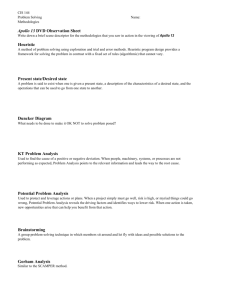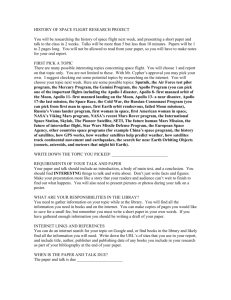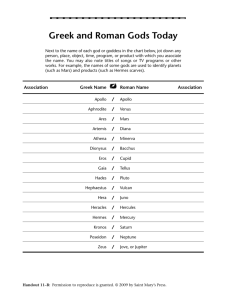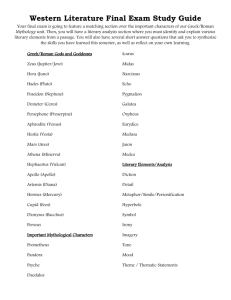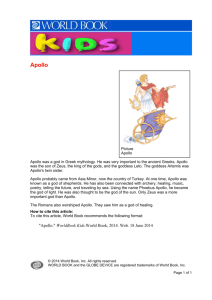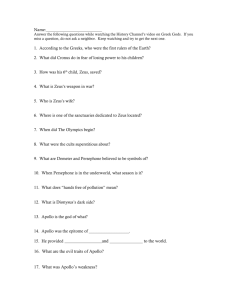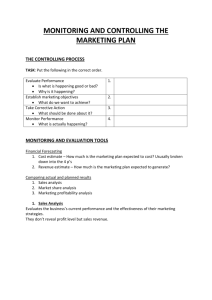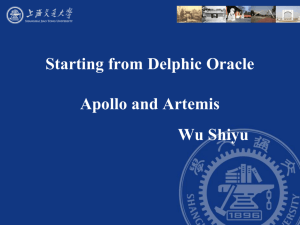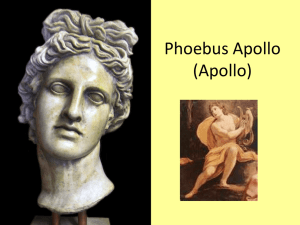2011 Short Answer Section of the Absolute Monarchs, Enlightened
advertisement
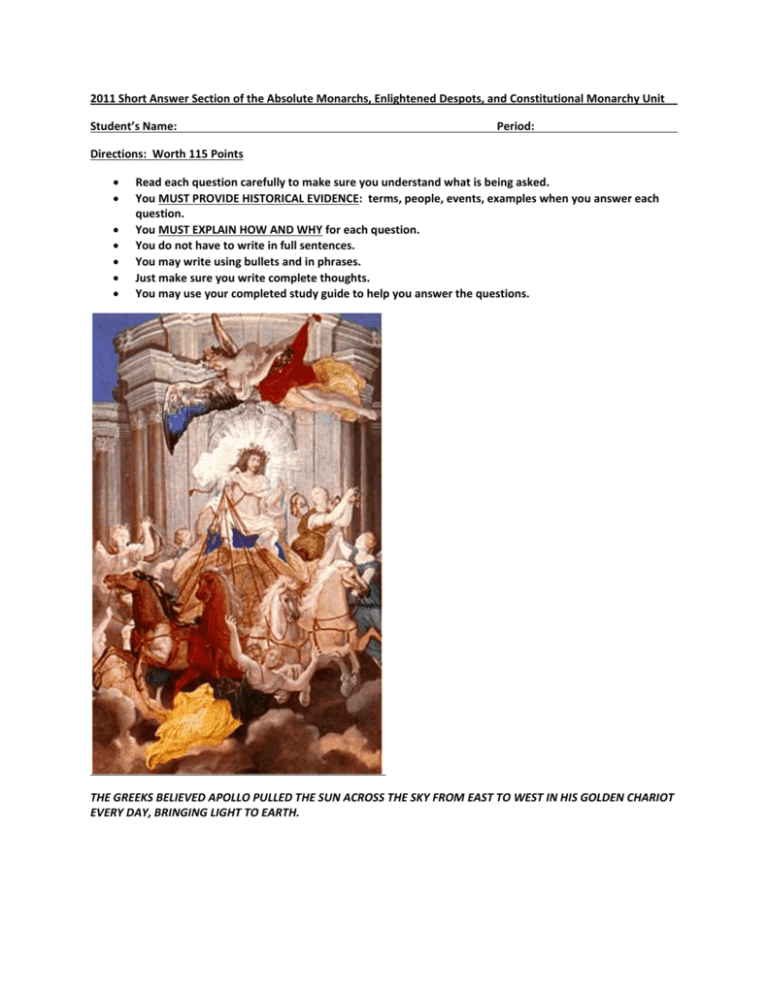
2011 Short Answer Section of the Absolute Monarchs, Enlightened Despots, and Constitutional Monarchy Unit Student’s Name: Period: Directions: Worth 115 Points Read each question carefully to make sure you understand what is being asked. You MUST PROVIDE HISTORICAL EVIDENCE: terms, people, events, examples when you answer each question. You MUST EXPLAIN HOW AND WHY for each question. You do not have to write in full sentences. You may write using bullets and in phrases. Just make sure you write complete thoughts. You may use your completed study guide to help you answer the questions. THE GREEKS BELIEVED APOLLO PULLED THE SUN ACROSS THE SKY FROM EAST TO WEST IN HIS GOLDEN CHARIOT EVERY DAY, BRINGING LIGHT TO EARTH. Apollo: The son of Zeus and Leto, and the twin brother of Artemis. Apollo was the god of music (principally the lyre, and he directed the choir of the Muses) and also of prophecy, colonization, medicine, archery (but not for war or hunting), poetry, dance, intellectual inquiry and the care-giver of herds and flocks. He was also a god of light, known as "Phoebus" (radiant or beaming, and he was sometimes identified with Helios the sun god). His attributes are the bow and arrows, on his head a laurel crown, and the cithara (or lyre) and plectrum. But his most famous attribute is the tripod, the symbol of his prophetic powers. Apollo could also be ruthless when he was angered. The mortal Niobe, boasted to Apollo's mother Leto, that she had fourteen children (in some versions six or seven), which must make her more superior than Leto, who had only bore two. Apollo greatly angered by this slew her sons, and Artemis killed Niobe's daughters. Niobe wept so much that she turned into a pillar of stone. Apollo was infuriated when the satyr Marsyas challenged Apollo to music contest. After winning the competition, Apollo had Marsyas flayed alive, for being so presumptuous, as to challenge a god. In art Apollo is at most times depicted as a handsome young man, clean shaven and carrying either a lyre, or his bow and arrows. There are many sculptures of Apollo and one of the most famous is the central figure from the west pediment of the Temple of Zeus, at Olympia, showing Apollo declaring victory in favor of the Lapiths in their struggle against the Centaurs. 66. Why might Louis XIV adopt the persona of the “Sun King”? Refer to the THREE VISUAL PRIMARY SOURCES on the previous pages and make connections to your prior knowledge. How does this persona connect to Absolute Monarchy and basis for power? Worth 5 Points 67. How is the myth of Apollo similar to the life of Louis XIV? You must give at least TWO examples and explain. Worth 20 Points a) b) Read the following primary source “Essay on Forms of Government” by Frederick II (the Great) of Prussia: “Consequently, [the sovereign or RULER] is guilty if he wastes the money of the people, the taxes which they have paid, in luxury, pomp and debauchery. He who should improve the morals of the people, be the guardian of the law, and improve their education should not pervert them by his bad example... They have not been placed at the head of the State to keep around themselves a crowd of idle loafers (lazy) whose uselessness drives them towards vice... The sovereign is the representative of his State. He and his people form a single body. Ruler and ruled can be happy only if they are firmly united. The sovereign stands to his people in the same relation in which the head stands to the body. He must use his eyes and his brain for the whole community, and act on its behalf to the common advantage. If we wish to elevate monarchical above republican government, the duty of sovereigns is clear, they must be active, hard working, upright and honest and concentrate all their strength upon filling their office worthily, that is my idea of the duties of sovereigns.” 68. How does this primary source relate to the definition and key characteristics of an Enlightened Despot? Worth 5 Points 69. Using your knowledge of Catherine the Great, provide FOUR EXAMPLES…one for each category examining how she lived up to the expectations set by Frederick II. Worth 40 Points Areas Political: Economic: Specific Actions Explanation/Connections to Expectations Areas Specific Actions Explanation/Connections to Expectations Social: Cultural: Read the following primary source quote and answer the corresponding questions: “The state of monarchy is the supremest thing upon earth; for kings are not only God’s lieutenants upon earth, and sit upon God’s throne, but even by God Himself they are called gods… Kings justly gods, for they exercise a… divine power upon earth… God hath power to create or destroy, make or unmake at His pleasure, to give life or sent death to judge and to be judged nor accountable to none, to raise low things and to make high things low at His pleasure… And the like power of kings… “-King James IV/I of Britain, 1609 70. What concept associated with Absolute Monarchy is addressed in this quote? Give TWO parts from the quote that support this and explain each part. Worth 15 Points Concept: a) b) 71. Based upon your knowledge of the Stuarts, give THREE examples of actions that King James I, King Charles I, King Charles II, or King James II did that support the above concept and explain how. Worth 30 Points a) b) c)
